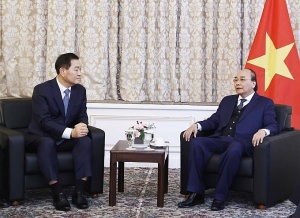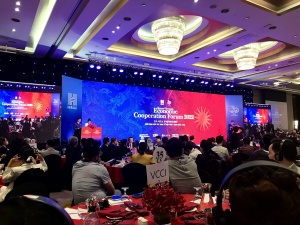How to take advantage of South Korea’s green expertise
In South Korea, local governments that have not been able to carry out the project in advance due to the environmental and economic results of the conversion to eco-industrial parks (eco-IPs) are raising their voices calling for early adoption.
 |
| Hong Seung Hee Expert, Verywords |
Industrial complexes serve as the engine of economic growth in South Korea. Entrepreneurs have created numerous products and supplied them to the market, as well as exporting them overseas, laying the foundation for the South Korean economy to rise to the top 10 in the world.
Eco-IP construction projects start from public awareness that sustainable development cannot be achieved without changing general industrial complexes. The reason why eco-IPs have been able to develop in Europe was because it was easy to secure the necessary funds for development due to the European Regional Development Fund, as well as the awareness of the environment, and the mental consensus among managers was maintained.
In South Korea, eco-IP construction and operation through a joint industry/academia/research institute had remarkable environmental as well as economic effects. It began as a pilot project in five regions in 2005, proceeded with the second-stage project from 2010 to 2014, and went through the national three-stage construction process from 2015 to 2019. It has produced positive economic results.
The national eco-IP project implemented incentives to invest more than $483 million in eco-friendly investments such as energy efficiency, industrial symbiosis, and waste management.
By implementing the national eco-IP programme, South Korea was able to reduce 1.7 million tonnes of oil equivalent energy consumed by the industrial sector, 8.54 million tonnes of carbon dioxide emissions, and 6.85 million tonnes of waste in the industrial sector. South Korea’s eco-IP initiative has also helped create nearly 1,000 new jobs.
The commercialisation of environmental projects in the eco-IP programme has greatly accelerated sustainable development and at the same time stimulated the economy.
In the early stage of the project, there were obstacles such as lack of cooperation among related ministries, legal and institutional limitations, increasing demands from local governments, and financial problems of enterprises.
Therefore, in order to expand the eco-IP project nationwide as a sustainable industrial complex model and develop it as a tool for strengthening competitiveness, a material exchange system was made between private power companies, government agencies, and cooperative companies between universities.
If attracting new companies required for eco-IPs, active incentives, subsidies, education, and information provision by local and central governments may be required to solve the problem of not generating economic benefits at the beginning.
It is also effective to enact a special short- and long-term law that targets companies living in eco-IPs that are different from general industrial complexes. To this end, prompt communication between relevant ministries of the Vietnamese government and provinces, as well as cooperation between domestic and foreign-invested companies, are necessary to increase the voluntary occupancy rate of companies.
 |
| How to take advantage of South Korea’s green expertise, Photo: Shutterstock |
In the case of eco-IP development in South Korea, Europe, the US, Japan, and Thailand, as in South Korea, the types of by-products that can be used by industry vary according to the nature of the industry.
In the case of South Korea, when an eco-IP is formed centred on one branch of a large corporation, organic collaboration led by large corporations and subcontractors have made rapid progress towards a single goal.
However, in terms of scalability, rather than relying on a single company, the government, eco-IP organisers, and experts in each field should be utilised as a long-term plan at the national level.
To reduce the trial and error experienced by South Korea, Vietnam should pay attention to the limitations of the early stage of the South Korean eco-IP. In the first stage, the establishment of the infrastructure was the most important task. The organisation in charge set themes and visions for each industrial complex and devoted time to establishing the policy direction and implementation system, such as research services for establishing strategies and discovering tasks.
In addition, attention was paid to the establishment of infrastructure such as a resource and energy database to systematically manage the inflow and outflow information required for production by companies that will be located in each ecological complex. It was diagnosed that the establishment of an eco-IP would be smoother if the planned occupancy method was established through the formation of a consultative body among companies that voluntarily supply information, as it is sensitive information related to the generation of waste by companies.
Companies that moved into such facilities exchanged materials and energy generated in the production process in terms of efficiency, and the local government attracted new companies to form an appropriate material circulation model by thoroughly analysing the flow of materials in the complex.
Through this, the local government reduced the burden of waste treatment by moving in recycling companies within it, and individual companies reduced costs by using recycled raw materials, which ultimately resulted in revitalisation of the local economy.
In the construction of an eco-IP, the participation of voluntary companies is important. Based on South Korea’s experience, in order to directly or indirectly participate in companies that help build eco-IP in Vietnam, not only preferential benefits at the local level, but also close cooperation between the South Korean and Vietnamese governments is required.
In the case of the Korea Energy Agency, it helped establish a systematic energy demand management by identifying the energy use status by industrial complex. For Vietnam, based on agricultural waste generated from agricultural-based industries, it has sufficient foundation to create an eco-industry easily by fusion with South Korean technology such as biogas and small hydropower.
In order to establish an ecological network, communication channels with South Korean companies willing to enter Vietnam can be used as a way to promote investment. Elsewhere, Europe is enjoying the additional tourism effect of being a global environmental centre, brought about by the implementation of eco-IPs.
Some South Korean investors already have plans to implement South Korean-style clean IPs in Vietnam. The northern province of Hung Yen has issued a decision to establish the Vietnam-South Korea economic cooperation facility called Clean IP.
The project is being jointly developed by LH Group of South Korea, TDH Ecoland Company of Vietnam, and some South Korean investors. The economic cooperation will cover 140 hectares inside Ly Thuong Kiet IP and Urban Service Complex and boasts funding of over $77 million.
It is part of an economic cooperation project promoted by the South Korean government in the housing, real estate, and industrial sectors in Vietnam via its New Southern Policy. According to the plan, the construction of the Clean IP is expected to be completed in 2024.
Besides that, Korea Industrial Complex Corporation (KICOX) has cooperated with the World Bank Group to provide consulting services for the resource efficiency pilot project of Hoa Khanh IP in Danang.
The contract was established because the South Korean Ministry of Trade, Industry, and Energy wanted to help IPs in various developing countries improve the resource and energy efficiency by making good use of South Korean eco-IP establishment models.
KICOX is handing down eco-IP policy experience and successful cases, developing symbiosis projects in Danang, coming up with plans for feasibility studies and medium/long-term development strategies, and designing customised projects for the complex.
 | Samsung to raise total investment in Vietnam to $20 billion Samsung Electronics vice chairman Han Jong-hee said the company would raise total investment in Vietnam to $20 billion, focusing on artificial intelligence and big data. |
 | Vietnam-South Korea forum takes peek at upcoming trade prospects Based on the 30-year journey of companionship between the two countries since the establishment of diplomatic relations, the Vietnam-South Korea Economic Cooperation Forum opened up opportunities for leaders and businesses of the two sides to discuss cooperation in the coming years. |
What the stars mean:
★ Poor ★ ★ Promising ★★★ Good ★★★★ Very good ★★★★★ Exceptional
Related Contents
Latest News
More News
- Dong Nai experiences shifting expectations and new industrial cycle (January 28, 2026 | 09:00)
- An Phat 5 Industrial Park targets ESG-driven investors in Hai Phong (January 26, 2026 | 08:30)
- Decree opens incentives for green urban development (January 24, 2026 | 11:18)
- Public investment is reshaping real estate’s role in Vietnam (January 21, 2026 | 10:04)
- Ho Chi Minh City seeks investor to revive Binh Quoi–Thanh Da project (January 19, 2026 | 11:58)
- Sun Group launches construction of Rach Chiec sports complex (January 16, 2026 | 16:17)
- CEO Group breaks ground on first industrial park in Haiphong Free Trade Zone (January 15, 2026 | 15:47)
- BRIGHTPARK Entertainment Complex opens in Ninh Binh (January 12, 2026 | 14:27)
- Ho Chi Minh City's industrial parks top $5.3 billion investment in 2025 (January 06, 2026 | 08:38)
- Why Vietnam must build a global strategy for its construction industry (December 31, 2025 | 18:57)

 Tag:
Tag:



















 Mobile Version
Mobile Version